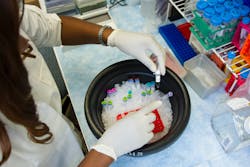NIH awards $248.7 million for COVID-19 testing technologies
The National Institutes of Health (NIH) is investing $248.7 million in new technologies to address challenges associated with COVID-19 testing, the agency said in a press release.
NIH's Rapid Acceleration of Diagnostics (RADx) has awarded contracts to seven biomedical diagnostic companies to support a range of new lab-based and point-of-care (POC) tests that could significantly increase the number, type and availability of tests by millions per week as early as September 2020, NIH said, adding that the national demand for testing is projected to increase by millions more tests per day above current levels.
The seven technologies use different methods and formats and can be performed in a variety of settings. Four of the technologies introduce innovations in laboratory-based testing technologies including next-generation sequencing, CRISPR and integrated microfluidic chips that could dramatically increase testing capacity and throughput while reducing the time to receive test results. Three technologies use platforms to provide nucleic acid and viral antigen tests that can give rapid results at the point of care, such as offices, manufacturing facilities, childcare centers, nursing homes and schools. Additionally, some of the tests offer more convenient sampling, such as saliva testing
The U.S. Food and Drug Administration (FDA) has been working with NIH and RADx to provide general advice on test validation and is prioritizing the review of emergency use authorization (EUA) for tests supported by RADx. The companies awarded have either received EUA from the FDA for their COVID-19 test or have applications in process.
NIH launched RADx on April 29, 2020, just days after receiving an emergency supplemental appropriation of $1.5 billion from Congress to support innovative technologies to make millions of rapid COVID-19 tests per week available to Americans by the fall.
These companies have received financial support for manufacturing and ramping up operations:
· Mesa Biotech, San Diego, CA. The company's Accula SARS-CoV-2 test employs a handheld RT-PCR device and a compact, single-use cartridge that detects viral RNA at the point-of-care. Results can be read from the removable cartridge in 30 minutes.
· Quidel, San Diego, CA. The Quidel Sofia SARS Antigen FIA test kit, a lateral flow immunoassay, is used with Sofia and Sofia 2 analyzers in point-of-care settings, such as a doctor's office or pharmacy. HHS has identified this technology for use in nursing homes. The analyzers give electronic results within 15 minutes.
· Talis Biomedical, Menlo Park, CA. The Talis One COVID-19 point-of-care test is a multiplexed cartridge used with the compact Talis One instrument. The test detects SARS-CoV-2 through isothermal amplification of viral RNA and an optical detection system, with results in under 30 minutes.
· Ginkgo Bioworks, Boston, MA. To process tens of thousands of individual tests at once, Ginkgo Bioworks uses automation for handling samples and high-throughput, next-generation sequencing technologies to analyze the samples. Working with universities, schools, public or private companies and local communities, Ginkgo Bioworks will provide end-to-end sample collection and report results within 24-48 hours from sample receipt. The company is expected scale up to 50,000 tests per day in September 2020 and 100,000 per day by the end of the year.
· Helix OpCo, San Mateo, CA. Helix will ship standardized kits in bulk for the collection of nasal swabs to public health departments, healthcare systems, employers, and other customers. The goal is to collect tens of thousands of samples that can be processed in very high volumes, using a combination of automated processes and the use of next-generation sequencing technologies.
· Fluidigm, South San Francisco, CA. Each BioMark HD microfluidics platform has the capacity to process thousands of SARS-CoV-2 PCR tests per day with a primary focus on saliva samples. With many existing Fluidigm instruments in clinical and research labs throughout the United States, scale up and deployment of their advanced integrated fluidic chips can provide tens to hundreds of thousands of new tests per day in fall 2020.
· Mammoth Biosciences, South San Francisco, CA. The Mammoth Biosciences SARS-CoV-2 DETECTR assay uses CRISPR technology, which provides a simpler workflow and significantly faster turnaround time compared to conventional laboratory PCR tests. This high-throughput solution can result in a multi-fold increase in testing capacity in commercial laboratories.

